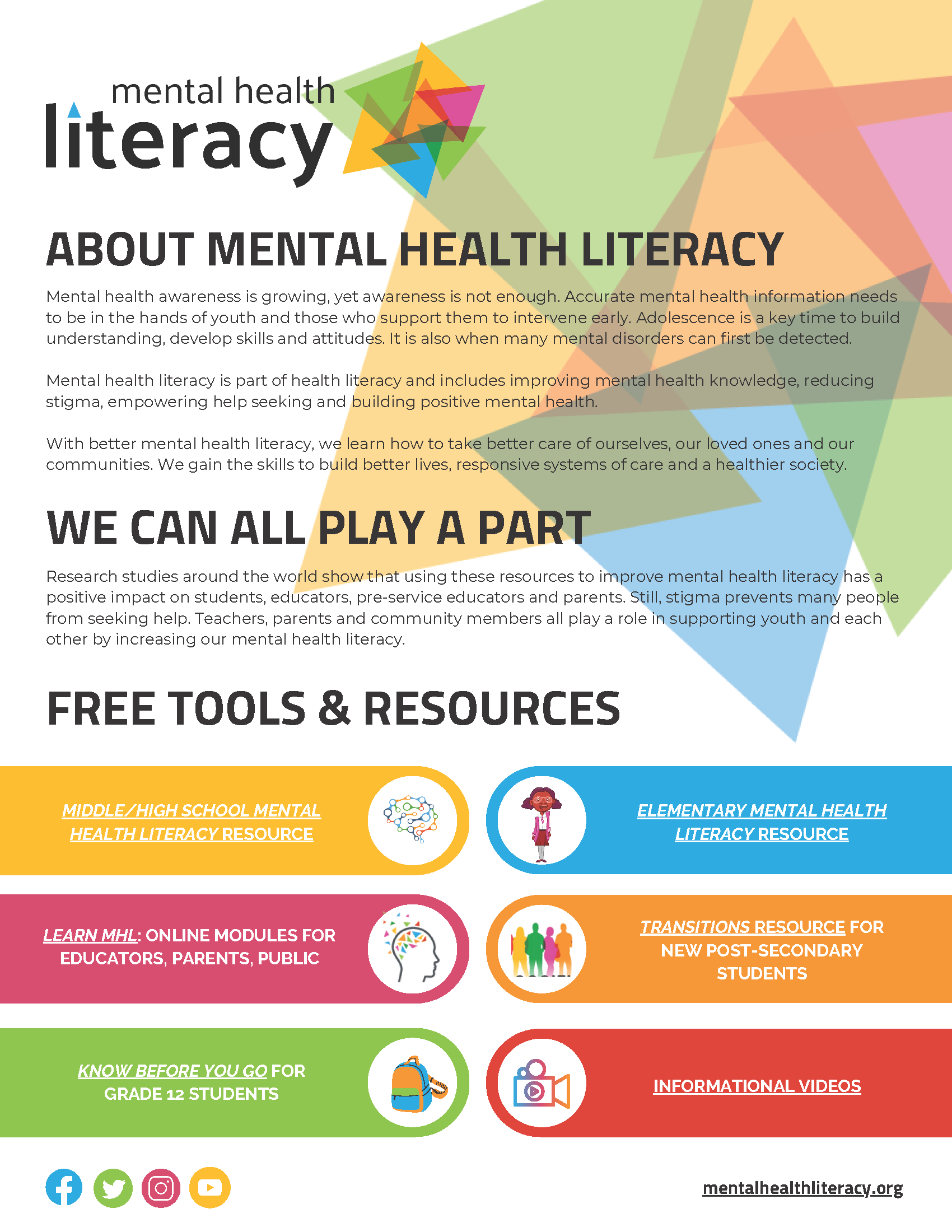The Importance Of Mental Health Literacy Education: A Comprehensive Guide

Table of Contents
Understanding Mental Health Literacy
Defining Mental Health Literacy
Mental health literacy encompasses the knowledge and skills needed to understand mental health conditions. This includes recognizing symptoms of various mental health issues, understanding risk factors, knowing how to access support and treatment, and challenging the stigma surrounding mental illness.
- Identifying symptoms of depression, anxiety, bipolar disorder, schizophrenia, and other conditions.
- Understanding the impact of stress, trauma, and genetics on mental health.
- Knowing where to find help, such as therapists, support groups, helplines, and crisis services.
- Recognizing the difference between normal emotional fluctuations and diagnosable mental health conditions.
- Challenging negative stereotypes and misconceptions about mental illness.
The Impact of Low Mental Health Literacy
Low mental health literacy has severe consequences. A lack of understanding can lead to delayed help-seeking, increased stigma, and worsening mental health outcomes.
- Delayed help-seeking: Individuals may delay or avoid seeking professional help due to a lack of awareness or understanding of their condition. This can lead to prolonged suffering and more severe symptoms. Studies show that delayed treatment for depression, for example, can significantly worsen prognosis.
- Increased stigma: Misinformation and lack of understanding fuel stigma, leading to discrimination, isolation, and shame, preventing individuals from seeking help.
- Exacerbation of symptoms: Untreated mental health conditions can worsen over time, potentially leading to serious consequences, including suicide. The World Health Organization reports that suicide is a leading cause of death globally, often linked to untreated mental illness.
- Social isolation: Individuals struggling with mental health issues may withdraw from social interactions due to fear of judgment or misunderstanding, further exacerbating their condition.
The Benefits of Mental Health Literacy Education
Early Intervention and Prevention
Improved mental health literacy leads to earlier identification and intervention, significantly improving treatment outcomes. Early detection allows for timely intervention, reducing the severity and duration of symptoms.
- School-based programs that educate children about mental health can foster early identification of issues and encourage help-seeking behavior.
- Workplace training can create supportive environments and promote early intervention for employees.
- Early intervention programs for at-risk populations, such as adolescents and veterans, have shown to be particularly effective in preventing more severe mental health problems. Proactive strategies, including mindfulness techniques and stress-management training, can contribute significantly to long-term mental well-being.
Reducing Stigma and Discrimination
Mental health literacy education plays a crucial role in reducing misconceptions and promoting empathy and understanding towards individuals with mental health conditions.
- Open conversations about mental health can help normalize the experience and reduce the shame and secrecy surrounding it. Sharing personal stories can be especially powerful in destigmatizing mental illness.
- Educational campaigns that challenge negative stereotypes and promote accurate information can effectively combat stigma.
- Implementing inclusive language and avoiding stigmatizing terminology in public discourse is essential.
Empowering Individuals and Communities
Mental health literacy empowers individuals to take control of their mental well-being and fosters supportive communities.
- Community-based mental health initiatives, such as support groups and peer-to-peer support programs, create safe spaces for individuals to connect and share their experiences.
- Empowerment through knowledge and self-management techniques improves resilience and coping skills.
- Improved mental health literacy contributes to building stronger and more supportive communities where individuals feel comfortable seeking help.
Implementing Effective Mental Health Literacy Education Programs
Target Audiences and Approaches
Effective mental health literacy education programs should target diverse audiences using appropriate methods.
- School-based programs can integrate mental health education into the curriculum, using age-appropriate materials and interactive activities.
- Workplace training can equip employees with the knowledge and skills to recognize mental health challenges in themselves and their colleagues.
- Community workshops and public awareness campaigns can reach wider audiences, promoting understanding and reducing stigma. Online courses and interactive resources offer flexible and accessible learning opportunities.
Curriculum Development and Resources
Evidence-based curricula and accessible resources are crucial for effective mental health literacy education.
- Curricula should include interactive activities, real-life case studies, and opportunities for discussion and skill-building.
- Resources such as government websites (e.g., NIMH), mental health charities, and academic institutions provide valuable information and support materials.
- Reliable and up-to-date information is paramount to ensure the accuracy and effectiveness of educational programs.
Measuring the Impact of Education Programs
Evaluating the effectiveness of mental health literacy education programs is vital to demonstrate their impact.
- Surveys, focus groups, and pre- and post-tests can assess changes in knowledge, attitudes, and behaviors.
- Data collection and analysis are crucial to track progress, identify areas for improvement, and demonstrate the program's effectiveness.
- Longitudinal studies can track the long-term impact of mental health literacy education on individuals and communities.
Conclusion
Investing in mental health literacy education yields significant benefits: early intervention, reduced stigma, and empowered communities. Improved mental health literacy leads to better outcomes for individuals struggling with mental health conditions and creates a more supportive and understanding society. Invest in your mental well-being and the well-being of your community by championing mental health literacy education. Learn more today and become a part of the solution. Let's work together to improve mental health literacy and build a healthier future for everyone.

Featured Posts
-
 Are School Suspensions A Necessary Evil Examining The Evidence
May 03, 2025
Are School Suspensions A Necessary Evil Examining The Evidence
May 03, 2025 -
 The Urgent Need To Invest In Childhood Mental Health
May 03, 2025
The Urgent Need To Invest In Childhood Mental Health
May 03, 2025 -
 Onde Comprar Mini Cameras Chaveiro Melhores Lojas Online E Fisicas
May 03, 2025
Onde Comprar Mini Cameras Chaveiro Melhores Lojas Online E Fisicas
May 03, 2025 -
 Exclusive News Teslas Board Initiates Ceo Succession Planning
May 03, 2025
Exclusive News Teslas Board Initiates Ceo Succession Planning
May 03, 2025 -
 Tezyz Alelaqat Alaqtsadyt Byn Almmlkt Alerbyt Alsewdyt Wadhrbyjan
May 03, 2025
Tezyz Alelaqat Alaqtsadyt Byn Almmlkt Alerbyt Alsewdyt Wadhrbyjan
May 03, 2025
